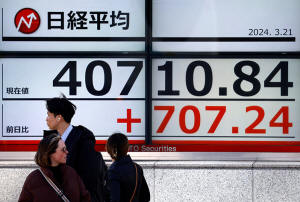Bulls on comedown after record highs, car makers skid on tariffs war
 Send a link to a friend
Send a link to a friend
 [June 13, 2024] By
Marc Jones [June 13, 2024] By
Marc Jones
LONDON (Reuters) - World stocks retreated from record highs on Thursday,
as the feel-good factor of slowing U.S. inflation and somewhat
comforting Fed signals made way for a fresh bout of politics- and
tariffs-induced weakness in Europe.
Bond market borrowing costs and the dollar rose after the Fed nudged
back rate cut expectations, but with the moves only partly reversing big
falls the previous day, markets are turning their focus to upcoming data
and policy meetings.
Europe's continent-wide STOXX 600 was driven 0.4% lower by a 1.5% slump
in its car makers as China signalled it would respond to the EU's move
to slap tariffs of up to 38.1% on China-made electric vehicles.
A drop in bank stocks as well not only pointed to the market's changed
outlook on rates but also the uncertainty caused by this week's sharp
swing to the right in EU elections and France's decision to call a snap
parliamentary election.
The difference, or 'spread', between French and German bonds was a
steady 61 basis points having hit its widest since March 2023 this week.
Standalone yields on most sovereign bonds were between 1-3 basis points
higher after Wednesday's softer-than-expected U.S. CPI figure that led
to their biggest falls since mid-May. [GVD/EUR]

The Fed shift "could have been big," AXA's Chief Economist Gilles Moec
said. "But I think it was drowned out by the U.S. inflation data we had.
So the data beat the Fed guidance."
On the EV tariffs, he said that the EU was at least taking a more
targetted company-by-company approach rather than the kind of blanket
measures seen from the United States.
"And protectionism is something that got quite a bit of traction during
the EU elections campaigns," he added.
Japanese shares and the yen had underperformed overnight as the Bank of
Japan began a two-day policy meeting that is expected to see it inch
towards a modest tightening of its policy stance.
MSCI's index of Asia-Pacific shares outside Japan climbed 0.6% though as
Taiwan's tech-heavy stock market surged 1.8% to a new high buoyed by the
U.S. S&P 500 and Nasdaq closing at all-time peaks on Wednesday.
CLOSE CALL
Chinese stocks had been dented slightly by the European EV tariffs
issue. But Hong Kong's Hang Seng still rose 0.5% and Wall Street futures
were pointing to further gains there later, with the S&P expected to
open 0.2% higher and the Nasdaq 0.6% better off. [.N]
"Ultimately, I think markets prefer strong and robust economic growth
with no rate cuts than faltering growth with multiple rate cuts," said
David Chao, global markets strategist, Invesco Asia Pacific.
[to top of second column] |

Passersby walk in front of an electric screen displaying Japan's
Nikkei share average outside a brokerage in Tokyo, Japan March 21,
2024. REUTERS/Issei Kato/file photo

"We are in this environment where I don't think it really matters
for markets when the first (Fed) rate cut is going to happen -
markets can still perform well."
In his post-meeting press conference on Wednesday, Fed Chair Jerome
Powell said the rate-path decision was a "close call" for many
policymakers, and to some degree a later start to rate reductions
this year had been compensated for with an additional cut in 2025.
The closely watched CPI report earlier in the day had showed core
U.S. prices growing at their slowest annual pace in over three years
last month and analysts also took the view that those figures
wouldn't have been ready in time for the Fed's forecasts.
"The Fed has changed its mind multiple times on its expected policy
path, so we don't put much weight on its new set of projections,"
BlackRock Investment Institute head Jean Boivin said.
The U.S. 10-year Treasury yield, which is the main driver of global
borrowing costs, was at 4.325% in Europe, bang in the middle of
where it had traded the previous day.
Australia's 10-year yields dropped as much as 10 bps to 4.196%.
Japan's 10-year yields fell as much as 3 bps to 0.955% for the first
time since May 17.
The Nikkei newspaper reported that the BOJ is likely to debate a
reduction in monthly bond purchases at its policy gathering ending
on Friday, echoing earlier reports from Reuters and other news
outlets.
The yen was a notable underperformer against the dollar overnight.
It lost 0.3% to 157.17 per dollar, erasing Wednesday's 0.3% advance
while the euro was steady at $1.08 after what had been its best day
of the year, albeit after three days of politics-driven losses.
In the other closely watched markets, gold fell 0.5% to $2,310.30
per ounce and oil dipped to $82.2 a barrel following a
bigger-than-expected rise in U.S. stockpiles. Brent crude though is
on course for its best week since early April.
(Addtional reporting by Kevin Buckland in Tokyo; Editing by
Jacqueline Wong)
[© 2024 Thomson Reuters. All rights
reserved.]
This material may not be published,
broadcast, rewritten or redistributed.
Thompson Reuters is solely responsible for this content.
 |